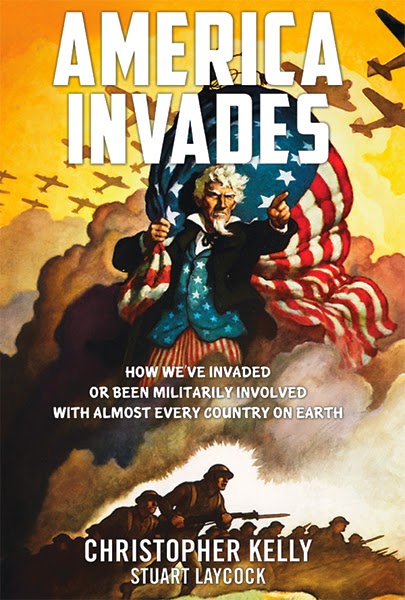 |
| Commander K. at Guards Memorial St. James Park, London |
"The World breaks every one and afterward many are strong at the broken places." Hemingway, A Farewell to Arms
This year we mark the centennial of the start of World War I - 1914 to 2014. This devastating war was a catastrophe that very nearly broke the fabric of Western civilisation. The war claimed more than 16 million lives including over 116,000 Americans (A staggering 26X more than the total 4,427 American combat deaths of the Iraq war!) and over a million from the British Empire. Is civilisation itself, as Hemingway might suggest, now stronger at the "broken places," the "fault lines" of this terrible conflict? Well, perhaps. We know, however, that Wilson's "war to end all wars" did not work out quite as intended.
 |
| WWI Munitions Great War Museum, Cortina, IT |
We also know that chemical weapons used in World War I continue to contaminate the water table of Belgium making it unsafe for infants to drink the local tap water http://www.bbc.co.uk/news/world-26678759.
 |
| Last Flight of the Hapsburg Eagle Great War Museum, Cortina, IT |
 |
| WWI Pilot, San Cassiano, IT |
 |
| Austrian Emperor Franz Joseph Fort Tre Sassi, Cortina, IT |
 |
| A Necessary War |
 |
| Commander K., Great War Museum Fort Tre Sassi, Cortina, Italy |
 |
| WWI Winter Warrior Great War Museum, Cortina, IT |
That same year President Wilson led the U.S. into the war on the side of the Triple Entente. There were four major factors driving Wilson's decision. First, the Kaiser had launched unrestricted submarine warfare that led to the sinking of merchant ships such as the Lusitania. Second, Germany had committed atrocities in its invasion of neutral Belgium executing many civilians and even a British nurse (See...http://americanconservativeinlondon.blogspot.co.uk/2012/10/edith-cavell.html). Third, Germany had clumsily plotted to ally herself with Mexico in the event of a U.S. intervention (Zimmerman telegram). Finally, Allied arms purchases had stimulated the American economy and made them substantial debtors to U.S. financial institutions.
Hastings writes, "The Americans accession of strength more than compensated for the Russian's retirement from the conflict in March 1918." (Source: Catastrophe 1914: Europe goes to War, Max Hastings, 2014).
 |
| "Johnny Get Your Gun" Great War Museum, Cortina, IT |
In 1918 Ernest Hemingway from Oak Brook, Illinois went "over there," volunteering to serve as an ambulance assistant on the Italian front. He was wounded by a mortar shell and spent six months in hospital recovering. His First World War novel, A Farewell to Arms, was published in 1929 (www.amzn.com/0684801469).
Hastings writes, "It would be entirely mistaken to suppose, as do so many people in the twenty-first century, that it did not matter which side won. The Allies imposed a clumsy peace settlement at Versailles in 1919, but it f the Germans had instead been dictating the terms as victors, European freedom, justice and democracy would have paid a dreadful forfeit. Germany adopted territorial war aims in the course of the First World War which were were not much less ambitious than those favoured by its ruler in the Second. It thus seems quite wrong to describe the undoubted European tragedy of 1914-18 also futile, a view overwhelmingly driven in the eyes of posterity by the human cost of the military experience. If the Kaiserreich did not deserve to triumph, those who fought and died in the ultimately successful struggle to prevent such an outcome did not perish for nothing, save insofar as all sacrifice in all wars is just cause for lamentation."
Source: Catastrophe 1914: Europe Goes to War, Max Hastings, 2013 (www.amzn.com/0307597059)
You can now purchase Commander Kelly's first book, America Invades here...www.americainvades.com or on Amazon...www.amzn.com/1940598427
And now Italy Invades: How Italians Conquered the World...
www.italyinvades.com
or on Amazon...
www.amzn.com/1940598729
And now Italy Invades: How Italians Conquered the World...
www.italyinvades.com
or on Amazon...
www.amzn.com/1940598729
An Adventure in 1914 is now available to pre-order...www.anadventurein1914.com
Now on Amazon Kindle...www.amzn.com/B01LXD1KHQ



3 comments:
War is always necessary.
War brings peace.
Peace comes.
Good post. I came late to an appreciation of how pervasive the WW1 experience is across Europe. Memorials to our "glorious war dead" are ubiquitous in the EU; quite different from the occasional town square monument found in the US.
The quote that put the war into its most stark perspective foe me follows:
"An attempt was made in the immediate aftermath of the First World War to represent in visual terms what the Empire’s loss meant (Courage Remembered by Edwin Gibson and G. Kingsley Ward, 1989):
Imagine [the dead] moving in one continuous column, four abreast. As the head of that column reaches the Cenotaph in London, the last four men would be in Durham [240 miles away, in the north of England]. In Canada that column would stretch across the land from Quebec to Ottawa; in Australia, from Melbourne to Canberra; in South Africa, from Bloemfontein to Pretoria; in New Zealand, from Christchurch to Wellington; in Newfoundland, from coast to coast; and in India, from Lahore to Delhi. [I might interpolate for an American audience: in the United States, from Boston to Philadelphia.] It would take those million men eighty-four hours, or three-and-a-half days, to march past the Cenotaph in London."
Excellent post. The centennial -- good idea to reflect on the Great War.
This is an excellent recent book that reveal much about the reasons for the war, while focusing on its often overlooked detractors: http://www.amazon.com/End-All-Wars-Rebellion-1914-1918-ebook/dp/B004X7TKUM/ref=dp_kinw_strp_1
Post a Comment